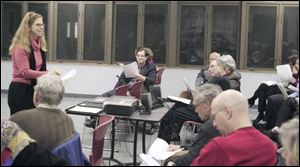
Toledo Jews learn ways to deal with anti-Semitism
1/19/2008
Shari Kochman of the Cleveland office of the Anti-Defamation League speaks at a workshop on responding to offensive, racist and anti-Semitic behavior. The program was held at the Jewish Community Center in Sylvania.
A co-worker cracks a joke. Everybody in the room laughs - except you.
You don't think there's anything humorous about making fun of a religious, racial, or ethnic group. In fact, you find the joke offensive.
But what do you do about it?
Shari Kochman, regional director of the Anti-Defamation League, led a program this week aimed at helping people deal with such troubling scenarios, titled "Confronting Anti-Semitism."
It's normal to feel angry or upset, but make sure you think before responding or reacting, Ms. Kochman told a group of about 50 adults meeting in the Jewish Community Center in Sylvania on Tuesday night.
Meanwhile, 14 college students from the local chapter of Hillel gathered in a nearby JCC room for a parallel program, geared for young adults, on confronting bigotry. That class was led by Ben Rancman, the ADL's assistant regional director.
The ADL leaders, based in Cleveland, came to Sylvania as part of an ongoing series addressing issues of concern to the Toledo-area Jewish community, said Wendy Goldstein, director of the Jewish Community Relations Council.
Although there was no specific incident that triggered the ADL talk, many audience members talked about being victims of anti-Semitism and bigotry at some point in their lives.
Ms. Kochman opened the evening with a brief video about the ADL, an international organization founded in 1913 "to stop the defamation of Jewish people and secure justice and fair treatment for all."
Today, the ADL's goals are "to protect, investigate, and educate," Ms. Kochman explained.
She said the nonprofit organization is not concerned only with anti-Semitism, but with bias against any group or individual. "In order to protect ourselves, we have to protect others. Anyone can be a target," she said.
Ms. Kochman reviewed some of the ways bigotry and hatred can be manifested, and discussed appropriate responses when someone is insulted, hurt, or threatened.
"There are no absolute rules. Everyone responds differently to a given situation," Ms. Kochman said.
Many people don't confront bigotry at the first encounter because they are too shocked to think and react, Ms. Kochman said. She even gave a personal account of how she failed to speak up when she should have.
While visiting family in California, she said, her niece began telling "Israeli" jokes.
"I did not confront her - and I work for the ADL!" Ms. Kochman said, still bothered by her niece's insensitivity and her own lack of action.
Some people make anti-Semitic comments out of ignorance, she said, and those situations provide opportunities for a "teachable moment."
One person in the audience said, for example, that a person he knows used the phrase "Jewing down" someone in negotiating a sale. When confronted, the person who used the term said he had never realized that it was offensive, and pledged not to use the phrase again.
On the other hand, some bigoted comments are made with the intent to insult or hurt people. Those cases are disturbing, and the best response is often just to walk away, Ms. Kochman said.
One woman in the audience said her boss and co-workers make bigoted comments every day about Jews, intentionally insulting her and her faith. She said the group routinely makes racial slurs as well.
"Not a day goes by without hearing something offensive," she said. "If I say something, it gets worse."
The woman said she cannot afford to quit her job and added that when she does not attend Saturday sessions because she is observing the Sabbath, her pay is reduced.
She feels trapped as well as offended, but vowed not to not sink to the level of the people she works with.
"Let them wallow in their bigotry. I don't want to be mired in their hatred," the woman said.
There are some cases, Ms. Kochman said sadly, in which "you can't change their minds or fix the problem."
Another woman said she never experienced anti-Semitism while growing up in Toledo, but was shocked when she was in college and student said to her, "You're Jewish? You're the ones who killed Christ."
A man who grew up in Milwaukee during the World War II era said that anti-Semitic comments, threats, and attacks he endured as a child still have a chilling effect on him.
As a youngster, he said, he "became the fastest runner on my block" to escape beatings, and hung out with other Jewish youths for safety's sake. He said a girl he asked out on a date in junior high school turned him down by saying, "I don't date Jews."
"I was a product of anti-Semitism. It stays with you. I feel scarred," he said. "I'm just suspicious of everybody who is not Jewish. I can't help it."
Ms. Kochman said there is "no vaccine to anti-Semitism and hatred," and that the ADL could not fix everyone's problems in one night.
Raising awareness of the problem and educating people about ways they can respond are steps in the right direction, Ms. Kochman said.
More information on the Anti-Defamation League is available online at www.adl.org.
Contact David Yonke at: dyonke@theblade.com or 419-724-6154.